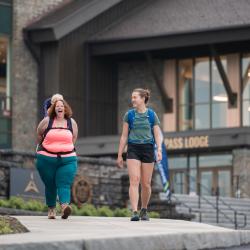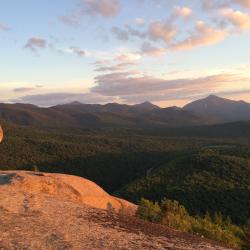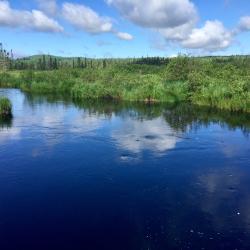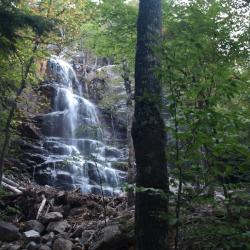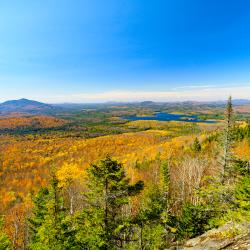Moderate Hikes
It's the perfect day — lunch on a mountain followed by a satisfying dinner in town. The best thing about half-day hikes is finding yourself someplace scenic with plenty of time to enjoy the view before the sun sets.
Be prepared
Winter hiking in the Adirondacks can be a rewarding experience, but it’s crucial to come prepared for the unique challenges of the season. Cold temperatures, snow-covered trails, and shorter daylight hours require hikers to plan carefully and bring appropriate gear. Essentials like extra layers, waterproof boots, microspikes, or snowshoes can make a significant difference in staying safe and comfortable. Winter weather can change rapidly in the mountains, so packing essentials like a map, compass, and fully charged phone is important too. Being well-prepared ensures you can fully enjoy the beauty of the Adirondacks in winter while prioritizing your safety.
We love our mountains, and you should too! Please help us protect them by enjoying them responsibly. Before heading out, review Leave No Trace principles, make sure you're prepared for the journey ahead, and familiarize yourself with regulations and weather in the mountains.
The Department of Environmental Conservation is a great resource for more outdoor recreation related information.
A little bit of effort goes a long way
We can't say these hikes are easy, but they will take you to some pretty amazing places. Get you up close and personal with one of the most picturesque waterfalls in the Adirondacks at Beaver Meadow Falls, or hike to Whiteface Landing and go swimming in Lake Placid, then contemplate whether you're up for the steep ascent of Whiteface Mountain, New York's fifth highest peak. If Whiteface seems like a bit much, try Hurricane Mountain.
If 2 to 4 hours is stretching it, try some easier 1 to 2 hour hikes, or check out our 4 to 8 hour hikes if you want something more challenging.
The Adirondack Hiking Essentials
1. Navigation
- Sign in at the trail head
- Map of your route
- Area trail guide book or maps
- Compass
- GPS
2. Don't get burned- bring sun protection
- Sunscreen
- Lip balm
- Sunglasses
3. Proper clothing and insulation
- Jacket, vest, pants, gloves, hat
- See Clothing below based on season/weather
4. Don't get left in the dark
- Flash light or head lamp with an optional spare
- Extra batteries for any equipment
5. First-aid supplies
- A complete First-aid kit
6. Be prepared with fire essentials
- Matches or lighter
- Waterproof container
- Fire starter for an emergency survival fire
- Remember to never leave a fire unattended and to be sure it is completely out before abandoning the site
7. Tools and supplies
- Knife, Swiss army or a multi-use pocket tool
- Kits for stove, mattress; duct tape strips
8. Keep energy up with proper nutrition
- Energy food (bars, gels, chews, trail mix)
- Energy beverages or drink mixes
- Lunch
- Extra day's supply of food
9. Stay hydrated- always bring enough water
- Water bottles, camel back or another portable hydration system
- Electrolyte tablets or powder
- Water filter or other treatment system
10. Emergency shelter
- Tent, tarp, bivy and a reflective blanket
- More than the 10 hiking essentials
- Multifunction watch with altimeter
- Binoculars
- Trekking poles
- Insect repellent and a head net
- Toilet paper
- Hand sanitizer or hand wipes
- Two-way radios
- Camera
- Cell or satellite phone
- Interpretive field guides for fauna and wildlife
- Post-hike snacks, water, towel, clothing change
- Trash bag for clean up
- Swim suits
Warm weather clothing options
- Moisture Wicking T-shirt and underwear
- Quick-drying pants or shorts
- Long-sleeve shirt both for bugs and sun protection
- Hat with a brim or neck cover for sun-shielding
- Fleece jacket or cover up with insulation
- Bandanna, head scarf or buff
Cool weather clothing options
- Thermal moisture wicking long-sleeve T-shirt
- Long underwear
- Hats, face mask or cover up
- Gloves or mittens
- Jacket providing insulation, temperature based
- Rain jacket and waterproof pants
- Insulated winter pants weather dependent
For winter hiking check out our cold weather preparedness blog and winter essential gear guide.
Proper footwear
- Hiking boots or shoes suited to terrain, preferably with ankle protection
- Synthetic or wool socks and a second pair
- Gaiters
- Sandals (for river fording, trip home)
- Crampons for ice
Leave No Trace
The magic of the Adirondacks is the result of previous generations taking a long view and protecting the mountains, lakes, and rivers within the Blue Line. That tradition continues today as we support and encourage everyone to practice Leave No Trace ethics, which help protect the lands and waters of the Adirondacks.




